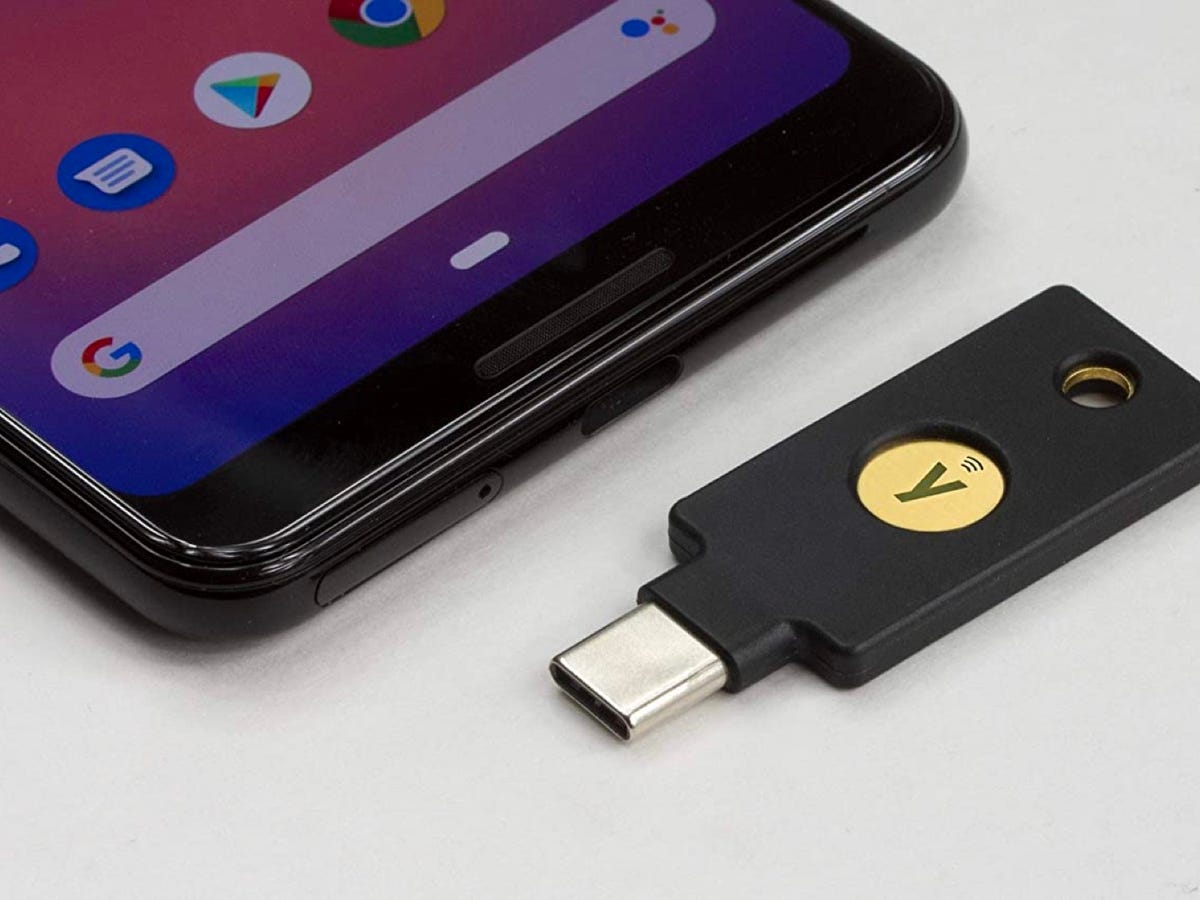What is a YubiKey?
A YubiKey is a hardware security key designed by Yubico, a company renowned for its prowess in creating encryption and authentication devices. This compact device enhances digital security by adding an extra layer of protection to the traditional username-password model, employing a method known as two-factor authentication (2FA) or multi-factor authentication (MFA).
The core philosophy of YubiKey is that even if a malicious entity has your password, they can’t access your account without the physical key. It’s an idea that perfectly encapsulates the adage: simplicity is the ultimate sophistication.

How Does a YubiKey Work?
YubiKeys hinges on the concept of 2FA and MFA. These systems necessitate at least two evidence types for user authentication. First, something you know (like a password), and second, something you have (the YubiKey).
Upon logging into a service that supports 2FA or MFA with YubiKey, you input your username and password. Then, you’re prompted to insert your YubiKey or connect it to your smartphone. The YubiKey communicates a unique, one-time passcode to the service, verifying your login request.
YubiKeys also support Universal 2nd Factor (U2F), an open authentication standard that simplifies and fortifies two-factor authentication through specialized USB or NFC devices.
Here is an official article about it.
Benefits of Using a YubiKey
Enhanced Security
The primary benefit of using a YubiKey is the enhanced security it offers. By requiring a physical device in addition to a password, it protects against common cyber threats like phishing, man-in-the-middle attacks, and password reuse. Even if someone manages to steal your password, they won’t be able to access your account without the physical YubiKey.
Related What is a computer malware
Resistance to Phishing
YubiKeys are particularly effective against phishing attacks. Unlike traditional 2FA methods such as SMS or email codes, which can be intercepted or redirected, the YubiKey’s authentication cannot be replicated or stolen. This is because the key generates a new, unique code every time it’s used.
Streamlined Authentication
YubiKeys simplify the authentication process. Instead of waiting for a text message or email with a code, you simply insert the YubiKey into your device or connect it via NFC. It’s quick, easy, and doesn’t rely on you having access to your phone or email account.
Longevity and Durability
YubiKeys are designed to withstand rough handling and environments. They’re waterproof, crush-resistant, and don’t require a battery, making them more durable and longer-lasting than many other 2FA devices.
How YubiKeys Enhance Online Privacy
In the digital age, online privacy is a paramount concern. Here’s how YubiKeys can contribute to safeguarding your privacy:
Mitigating Data Breaches
Data breaches often occur when unauthorized individuals gain access to databases containing personal information. By requiring physical authentication, YubiKeys make it significantly harder for hackers to gain access to your accounts, even if they’ve obtained your username and password.
Protecting Identity
Identity theft often begins with gaining access to a person’s email or other accounts. By securing your accounts with a YubiKey, you’re adding an additional layer of defense against these attacks.
Encryption
YubiKeys also support OpenPGP and PIV (Personal Identity Verification) standards, enabling encryption and decryption of sensitive data. This means you can store your private keys on the YubiKey, further enhancing your online privacy.
Practical Steps for Using a YubiKey
Let’s look at some practical steps on how to start using a YubiKey:
- Purchase a YubiKey: Yubico offers several YubiKey models to choose from. Make sure to select the one that fits your needs and is compatible with your devices.
- Set up your YubiKey: Follow Yubico’s instructions for setting up your YubiKey with your device. The setup process will differ depending on your device and the services you wish to secure.
- Register your YubiKey with services: Most services that support 2FA will have an option for security keys in their settings. Follow their instructions to register your YubiKey.
- Use your YubiKey: Whenever you log into a service with which your YubiKey is registered, you’ll be prompted to authenticate with your YubiKey after entering your password.
- Keep your YubiKey safe: Remember, your YubiKey is now a key to your accounts. Treat it with the same care you would for your house keys or credit cards.
In conclusion, YubiKeys offer a substantial level of protection for online accounts and personal information. In an age where digital threats are increasingly sophisticated and common, investing in a YubiKey can be a powerful step towards securing your digital life. With their ease of use, robust security, and commitment to privacy, YubiKeys are a worthy addition to any security-conscious individual’sor organization’s toolkit.
Future of YubiKeys
As we move towards a more digitized world, the importance of robust security measures continues to grow. Yubico, the company behind YubiKeys, is continuously innovating to meet these needs. Future YubiKeys might have more features integrated, like biometric authentication, to further enhance security.
While YubiKeys currently supports a variety of authentication protocols, we can expect broader support for emerging standards in the future. This will make YubiKeys even more versatile and widely applicable for a range of security needs.
Additionally, as more people become aware of the importance of digital security, we can anticipate wider adoption of physical security keys. YubiKeys may become as common as house keys in the future, with people carrying them around to protect their digital identities.
The future looks bright for YubiKeys and similar technologies. As we continue to entrust more of our lives to the digital realm, tools like these will play an increasingly critical role in ensuring our information remains secure.
In conclusion, YubiKeys offer a practical, robust, and user-friendly solution for enhancing digital security. They are a testament to the role innovative technology can play in addressing some of the most pressing challenges of our digital age. Whether for personal use, business applications, or high-stakes governmental and defense scenarios, YubiKeys provide a substantial layer of protection and peace of mind in navigating the digital world.
]]>
Let us now go through the unique features and attributes of the above-mentioned different computer malware types.
What is Computer Malware?
01. Computer Virus
A computer virus replicates itself with the support of other executable programs in the host machine. There are various ways that this type of malicious software could enter a computer. Some of the most common entry points are through a computer network, through external storage devices, and through email attachments. After entering the machine, it attaches itself with executable files in the host computer.
Thereafter the process of self-replication commences. This is how it spreads into other files or programs in the host machine, infecting them in-line. Once a computer virus enters the machine, it is always in the active state. That is due to its aforementioned attachment with executable files. A computer virus has the ability to damage the data, hardware and the software of the infected machine.
02. Computer Worms
Computer worms are somewhat similar to computer viruses, yet computer worms have some unique features. They have the ability to work on their own and spread on their own. The significance of computer worms is that they can duplicate themselves from one machine to another without attaching themselves onto them, unlike computer viruses. Email attachments and fake websites are some common entry points that computer worms use to invade computers.
03. Trojan Horse
One of the interesting points about this computer malware type is that a historic background lies behind this term ‘Trojan Horse’. It is based on how Greeks used a wooden horse as a tricky craft to deceitfully enter the city of Troy. This computer malware type acts the same. They always appear to be legitimate, and harmless. Hence, it deceives the users into loading and executing them on their devices. But once they are executed, they cause major harm to the host. So this behaviour depicts how good it matches the term ‘Trojan Horse’.
Once a trojan horse enters a machine, the machine might act weird in a number of ways. Automatically opening and closing windows, abrupt changes in the desktop, and disappearance of documents might be a few indications of a trojan horse attack. Apart from that, trojan horses are capable of stealing data and spying on the host. Of course, they distress the users in numerous ways.
04. Ransomware
Ransomware is one of the most popular computer malware types in the present world. Simply, it is a file-encrypting malware. Once ransomware enters a computer, it encrypts the user’s personal data in such a way that they cannot be recovered unless the user pays the attacker. The normal process is that the victim is shown instructions on how to make the payment to get the decryption key in return.
05. Adware
Adware is designed in order to display unwanted advertisements on a user’s screen. They might most probably appear as pop-ups, or rather as unclosable windows, within web browsers. Of course, they are not as harmful as computer viruses. Yet, they are still a form of malware that can become a hassle to the users.
06. Phishing
The basic concept behind phishing is misleading the user. Afterwards, hacking the information related to the user’s bank accounts and other online accounts will follow. In this case, the targeted user is most probably reached through an email or a text message. These messages are often sent posing as a legitimate organization, or a known person. Most of the time, along with these deceptive messages a link that appears to be important will also be sent. Once the user clicks this link, or fills and sends a seemingly real form, the user’s sensitive information will be stolen.
How to protect oneself from Computer Malware?
Now we have a clear idea on a few malware types, how they act, and what kind of impact they have on the host computers. Malware is still a serious threat. Therefore, let us now discuss how to protect our computer from these computer malware types.
- Install an Antivirus Software into your computer and keep it updated.
- Scan each and every external storage device that you connect to your computer, with the use of an updated Antivirus Software.
- Always use legitimate software.

If your computer is connected to the internet,
- Always enter into trusted websites.
- Use trusted websites to download software and other applications.
- Be conscious when opening email attachments. Do not click on suspicious links, and do not open suspicious emails and attachments.
- Use firewalls, virus guards, and email filters.
Related Importance of Cybersecurity in 2021